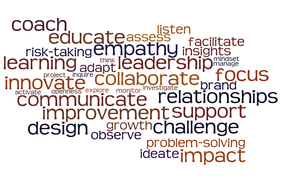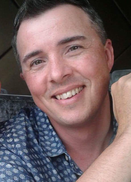Today's post blends the introduction of Episode 3 (#K12 podcast series: "Shifting from Professional Collaboration to Collaborative Professionalism") with an equally-important message. This message is not only about planning and implementing your start-up this year, but also about how we seek to be thinking and interacting with one another during the course of our collaborative work.
| Like the African Proverb, in the title of today's post, building relational trust is key to any other form of leadership you intend to enact in managerial and/or instructional capacities. You might think that this is inherent--already understood and a hallmark of the collaborative work underway in our leadership (formal and/or informal) practice. |
In the context of my external, professional learning network, I took a sample of Tweeps across two, Twitter profiles and focused not only how I came to know them and/or what we have done, but I took the time to consider how we interact, what they've done in support of my efforts, and/or how they make me feel.
Below, I've included a small sample of comments. If you consider the embedded pdf (or file attachment), you'll come across a few more.
Sample Comments
I'm grateful that you/we...
- Have been a consistent, early supporter of Flipping the Focus' mission to optimize learning by facilitating those interactions—be they f2f, blended or digital—to take teachers’ and PLC's improvement efforts from good to great
- Have one another for collaboration. We both value the importance of asking good questions, facilitating and making spaces for others to think...always encouraging the participation of others
- Have always supported my work as a classroom teacher, coach and voice in Ontario Education
| recognizing_a_challenge-_a_theory_of_action_for_relationship-building.pdf |
What should our success criteria be for cultivating collaborative cultures--much of it starting by expressing our gratitude for one another? Invariably, we will all have our own perspectives on this...collaboration is contextual...it's personal. Everyone (or every team, for example) collaborates differently (Hargreaves & O'Connor, 2018). If we are to collectively anchor into something that is characteristic of success, then we will be...
- engaging more often in co-creation
- producing & celebrating work, communications, reflections, etc. that unequivocally espouse more WE than I/ME
- driving our own professional learning (a characteristic of "Collaborative Professionalism," Hargreaves & O'Connor, 2018)
CONSIDER THIS: What's your perspective on success criteria for cultivating and sustaining collaborative cultures? Share your comments to this post.
As you complete today's post (and related exploration and/or reflection), I would encourage you to listen to Episode 3 (of 4...Episode 4 this Fall) in the "Shifting from Professional Collaboration to Collaborative Professionalism" podcast series. Although related closely to Episodes 1 and 2, in Episode 3 you’ll here the perspectives of a provincial, instructional coach (or Student Achievement Officer, SAO) as they describe some of the conditions they identified as being necessary for growing cultures of collaboration in teacher, professional learning communities.
For your convenience, the interview from Flipping the Focus’ YouTube channel has been embedded, below. In support of your viewing, a transcript (pdf) of the interview has also been provided, below.
| may_24_interview_re__collaboration_c_stewart___sao.pdf |
- As you continue thinking about the start of the school year, consider the messages in Episode 3--shared by an instructional coach. Coaches build relationships in unique 'spaces'--spaces where there are opportunities for engaging in frequent observation and feedback.
- Take a look at some of the actions in Figure 1: Do you incorporate these into your ongoing work with others? Reflect upon those things that others have done (are doing and continuing to do) in supporting you.
- Start with gratefulness; express yourself; and determine how you will serve the needs of others in your leadership.
What can I do to build strong, collaborative cultures amongst those I serve?
I am more than happy to collaborate with you and feature our learning, here, in this blog and across Flipping the Focus' social media platforms (Facebook and Instagram at FlippingtheFocus and
Twitter @flip4change), as well as those of your own.
Contact Flipping the Focus to see how we can work with you and your organizational improvement plans and processes.
Chris Stewart, OCT
Founder & Educational Consultant, Flipping the Focus (c) 2018
Student Achievement Officer (on secondment from the Upper Canada DSB to the Ontario Ministry of Education)
Fullan, M., & Quinn, J. (2016). Coherence: The right drivers in action for schools, districts, and systems. Thousand Oaks: Corwin.
Fullan, M., & Quinn, J. (2016, January). Coherence Making: How Leaders Cultivate the Pathway for School and System Change with a Shared Process. School Administrator, 30-34. Retrieved from https://www.scoe.org/files/Fullan_Quinn.pdf
Hargreaves, A & O’Connor, M.T. (2018). Seminar Series 274: Leading Collaborative Professionalism, Centre for Strategic Education, Melbourne, Victoria, Australia. Retrieved from http://www.andyhargreaves.com/online-reports--monographs.html
Kraft, M. A., & Blazar, D. (2018, August 09). Taking Teacher Coaching To Scale: Can Personalized Training Become Standard Practice? Retrieved from https://www.educationnext.org/taking-teacher-coaching-to-scale-can-personalized-training-become-standard-practice/

 RSS Feed
RSS Feed


